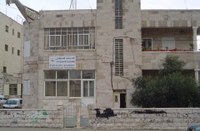 PALAST is the foremost scientific and technological "coordinating" agency in Palestine. It plays a leading role in defining Palestinian science priorities, advancing scientific and technological research through cooperation, promoting innovation, and fostering applications for science and technology for the benefit of society. The academy, with its headquarters in East Jerusalem and offices in Ramallah and Gaza, currently has 45 members.
PALAST is the foremost scientific and technological "coordinating" agency in Palestine. It plays a leading role in defining Palestinian science priorities, advancing scientific and technological research through cooperation, promoting innovation, and fostering applications for science and technology for the benefit of society. The academy, with its headquarters in East Jerusalem and offices in Ramallah and Gaza, currently has 45 members.
PALAST notes Imad Khatib, the Academy's secretary general, functions as "a crucible for scientific cooperation" both in Palestine and between Palestine and the global community scientific.
For example, PALAST has worked closely with Palestine Ministry of Health and the Palestine Red Crescent Society to improve the treatment of diabetes through more reliable and consistent medical care and the distribution of insulin to growing segments of the affected population. Another important PALAST-led public health initiative has encouraged efforts to curb micronutrient deficiencies among infants and adolescents through greater access to iodine-fortified table salt and wheat.
PALAST has also worked closely with the European Union (EU), the U.S. National Science Academy and IAP, the global network of science academies, on a broad range of issues, including biodiversity, climate change and regional water management. And it has led efforts to improve science education in Palestine, most notably in its support for an environmental centre on the West Bank just north of the Dead Sea that serves as an unconventional classroom and field laboratory for students and researchers.
PALAST, Khatib says, has overcome enormous obstacles to emerge as an active and well-respected organization. In the process, it has gained the admiration of political leaders and bi-lateral and international organizations abroad. The Academy has developed a wide-ranging portfolio of activities for the promotion of scientific research and training that has contributed in important ways to Palestinian society.
Despite limited funding and a host of fears and tensions, Khatib notes that members of PALAST have never "lost hope for a better future." Such "life-affirming persistence in the face of adversity," he observes, remains an important measure of the Academy's success.
Find the full TWAS Newsletter article below.

